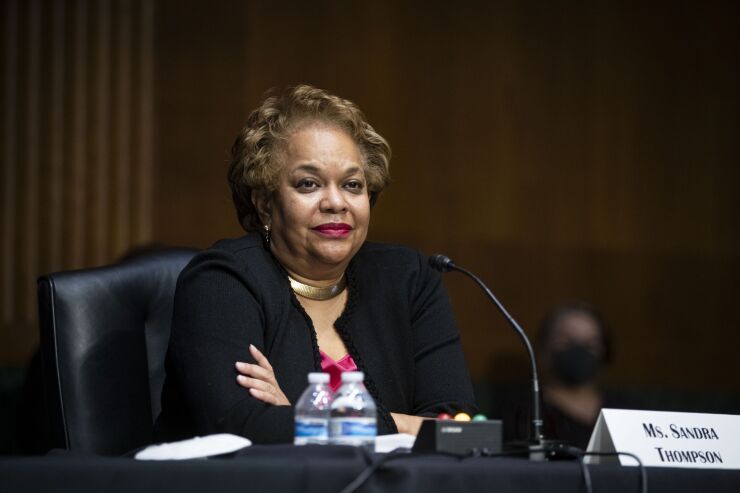As reported, the Federal Housing Finance Agency just wrapped up a series of
Over three days, the agency heard from 85 speakers. The vast majority of the presenters were closely connected to the Federal Home Loan bank system: member banks, insurance members, trade associations for members, Home Loan bank directors and clients. Two significant stakeholders in the system were glaringly absent, however.
Those stakeholders are depositors and taxpayers. Let's assume that the spokesperson for the mythical trade association, the Depositors and Taxpayers of America (DTA), was invited to speak. This is how his or her presentation would have gone:
"Greetings Director Thompson and FHFA staff.
I am here today representing the tens of millions of depositors and taxpayers of this country. DTA and its members ask that, through this 'comprehensive review' of the Home Loan banks, you correct an injustice that has been going on for far too long. Allow me to explain.
By denying depositors of all ages a fair return on their deposits, banks, in cooperation with the Home Loan Banks, are contributing to the problem of wealth and economic inequality on a national scale.
It is well understood that banks are motivated to fund themselves as cheaply as possible. The lower their funding cost, the higher is their net interest margin, a key success metric for all depository institutions.
In this regard, banks have three sources of funding: equity, deposits, and other borrowings. Equity is expensive so banks look to depositors and "other" sources (federal funds, securities lending, brokered deposits, etc.) for funding.
Now, most banks, large and small, are members of their local Federal Home Loan Bank. Established by Congress in 1932, these 11 firms have total assets that exceed $1 trillion. They were conceived to support housing finance, but they no longer play that role. Although the word "bank" is in their titles, they are not banks in any normal sense of that word.
The Home Loan banks issue debt obligations in the hundreds of billions of dollars. They are the second largest issuer of debt after the U.S. Treasury Department. Their debt is subsidized by all taxpayers — the members of DTA. How so?
Buyers of that debt, consisting mostly of money market mutual funds, presume correctly that the federal government will bail the Home Loan banks out if they experience any stress. Therefore, there is a lower risk premium associated with their debt. The Home Loan banks also enjoy an exemption from paying taxes at any level and have a standing line of credit from the federal government.
So, banks in search of new funding face a choice. They can either: a) Borrow more money from their customers, which requires them to raise the interest they pay on deposits or b) Borrow from their Home Loan banks at a discount. In a rising rate environment such as we are experiencing now, banks often choose the Home Loan banks over their own depositor-customers, all of whom are members of DTA.
And the choice banks make is not a fair one. Banks are incentivized to turn their backs on their own customers. They follow the incentives.
Lest there be any doubt, this is how one Home Loan bank brazenly pitches advances to its member banks: "In many instances, a migration of just a small amount (3%-5%) parked in an existing savings or money market deposit account to a high-cost deposit special may be sub-optimal from a profitability perspective compared to utilizing just-in-time liquidity from advances."
The injustice is that borrowings from the Home Loan banks are subsidized, unwittingly, by the membership of DTA. This happens in two ways. First, because of the government guaranty, the Home Loan banks offer below-market rates. Second, the Home Loan banks incur zero credit risk in lending to the banks because, even in the rare event of a bank failure, the Home Loan bank has a priority over the FDIC (and the taxpayer) in that bank's receivership.
The upshot is that it is cheaper for the banks to borrow from their Home Loan banks than from their own depositors. This should be of concern to depositors and taxpayers of all ages. It is why DTA has reached out to AARP and other affinity groups to raise their awareness of this important issue.
Luckily, the Home Loan banks' mission and operations are undergoing a thorough review by its regulator, the Federal Housing Finance Agency. The director of the Agency and her staff appear to understand that all is not right in the cosseted world of the Home Loan banks.
It will take public awareness, advocacy and political courage to stand up to the legions of lobbyists that the Home Loan banks have marshalled for this project. There is, however, an old saying in Washington that goes, 'Something is always impossible … until it becomes inevitable.'
Meaningful reform of the Federal Home Loan banks is no longer impossible.
Thanks for the opportunity to testify today."






